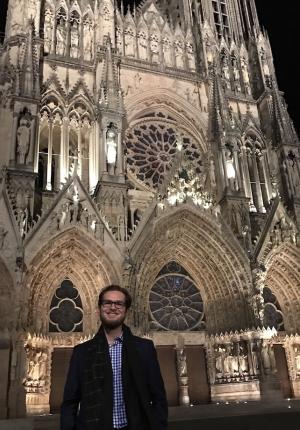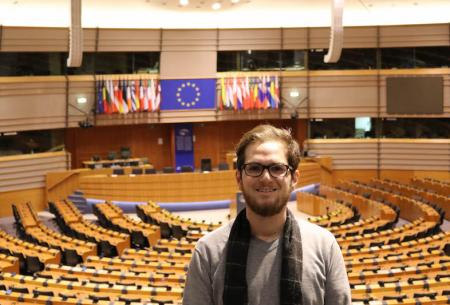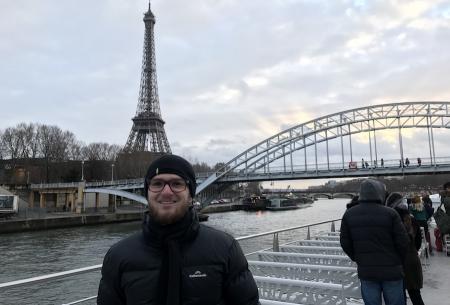Photo by David Iliff / CC-BY-SA-3.0
Study in France
The Goddard Sapin-Jaloustre Scholarship Trust offers grants to assist Australians in pursuing courses of study and projects (scientific, cultural and technical) in France.
About the trust
The Goddard Sapin-Jaloustre Scholarship Trust was established by Dr Jean Sapin-Jaloustre to honour the memory of his wife, Madame June Sapin-Jaloustre, who died in 1993 and his father-in-law the late Dr T H Goddard, a notable Hobart physician and francophile who was for many years the Consul for France in Tasmania.
Dr Goddard and Madame Sapin-Jaloustre were, during their respective lives, keenly interested and active in furthering intellectual, cultural and social exchanges between French and Australian citizens in the firm belief that much benefit thus flowed to the people of both countries. Dr Sapin-Jaloustre has endowed the scholarship fund to facilitate the continuation of those exchanges.
Recent projects
Studying international relations in France
Dylan Gloury, Goddard Sapin-Jaloustre Scholarship Recipient 2020
Dylan's project involved study at Sciences Po in Paris and a plan to visit the Interpol headquarters in Lyon and travel more widely. In the first two months he forged a deep connection with Paris but then along came COVID. He returned home on the last repatriation flight out and his report on his project concludes with an evocative account (slightly abridged here) of his last days in Paris:
"Shocked by the announcement [that Sciences Po was closing], I spent the next few days confirming that the semester would continue online and discussing with my European friends their plans to either wait it out or return home. I wasn’t willing to cut short the once in a lifetime experience that I was currently having. A few nights later, I was out celebrating one of my close friends’ last nights in Paris, when I noticed that everybody in the restaurant was suddenly checking their phones; we checked ours and saw that as of midnight all cafés, restaurants and bars were being forced to shut. We were all shocked, a feeling that was shared throughout the restaurant. After dinner we decided to have one last drink on a quiet corner in Montmartre and as we sat in the brasserie, it was saddening to think that as of that night, the whole culture of Paris was being forced to change for the first time in hundreds of years. Shops that had remained open in times of war and depressions would be shut, with Parisians no longer able to participate in the rituals that made them famous across the world. Over the next few days, I watched as the community realised the severity of the situation. Initially, most people continued to behave as normal, with people in the streets, parks and stores as they had been before. However, after a stern reminder from President Macron, the once bustling Montmartre streets became desolate. I had missed the opportunity for one last run, but if I had gone it would have been a different Paris. The markets no longer alive with shouting vendors, the parks and gardens abandoned, museums and galleries with their lights off, cafes with their chairs stacked, the Eiffel Tower with no-one to adore it and Notre Dame still standing there, burnt out and boarded up but seemingly forgotten, a reminder of a crisis now past. Over those last few days, I made the decision to stay and go a thousand times, but in the end the only decision I could make was to leave. On my final night in Paris and the last before the city went into a two-month lockdown, I went up to the Sacré Coeur one last time to say goodbye to the city I had grown to love so much. As I walked through the Place du Terte it felt like another world. The square was completely empty, there were no artists, no cafes, not even a hawker trying to sell his model Eiffel Towers – I took a moment in the square and actually felt lucky to have had the chance to see it like this. As I continued on to the Sacré Coeur I tried to hold onto this perspective and as I arrived at the church steps, no longer alive with hordes of students, tourists and locals, I looked out across the shimmering city deeply grateful for my time in France."



How to apply
Eligibility
Each year the Trust makes available from the proceeds a certain sum of money to support Australian Nationals pursuing courses of study or instruction, or conducting research or other projects in France.
- Applicants must be Australian Nationals.
- Applicants must have the equivalent of at least TCE level French stage 3.
- Applicants must provide details of the course or project, and offer a justification of its value.
- Applicants must provide an estimate of their travel costs, living costs, and course fees, and document how a scholarship fits into their overall budget.
- Applicants must advise how they are proposing to finance their program.
- Applicants must present evidence of institutional affiliation and support, ideally from both Australia and France.
- Applicants must present, within a month of returning to Australia, a report on their course or project.
- Applicants must, in any publication arising from their project, make due acknowledgment to the Goddard Sapin-Jaloustre Scholarship Trust.
Selection Criteria
The applications will be considered by a committee of the Trustees and such other co-opted persons as the trustees feel appropriate. The following criteria will guide their deliberations:
- How well applicants demonstrate the value to their education or project of studying in France.
- How well applicants have prepared themselves to make the most of the opportunity of being in France.
- How greatly the applicants' plans depend on financial support from the Trust.
- How far the applicants see their personal plans as being of wider value to Australia.
While all applicants will be fully considered, the committee will aim to ensure some appropriate spread in the range of successful applicants (male, female) and successful applications (scientific, cultural, technical). It will generally favour applications from persons who have not previously spent time in France.
Applications and Administration
- Applications are invited with a closing date of 31 October 2025 for travel in 2026.
- Application forms should be completed and signed. Please attach documentation (not originals) relating to (1) your nationality, (2) relevant parts of your educational record, (3) evidence of institutional affiliation, and (4) a statement of support from one of your referees. Post three copies of the application package to the address.
- Applicants will be notified in writing of their success or failure.
- For the successful applicants, at least half and as much as 80% of the sum awarded can be paid on receipt of copies of airline tickets and other prepaid expenses, and the remainder on receipt of a satisfactory report on the course and project.
Amount
This sum of money is used to provide a number of scholarships of varying value, depending on the length and expense of the course or project. Most common are scholarships of around $5000 for visits of between 1-3 months in duration.
Duration
One year
Closing Date
31 October 2025
Submissions
Eligible candidates are invited to apply for funds on the Application Form. Completed application forms should be submitted to:
Mr Damian Egan
Goddard Sapin-Jaloustre Scholarship Trust
Murdoch Clarke Lawyers
10 Victoria St
Hobart
Tasmania 7000
- Telephone:
- Facsimile:
- Email:
- Michael.+email+is+obfuscated+Bennett@utas.edu.au.nospam
